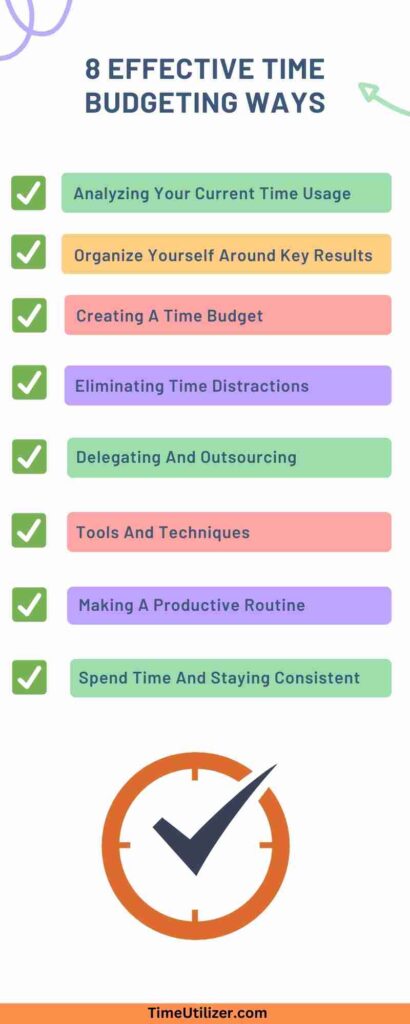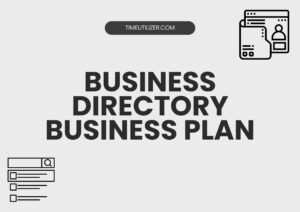
Introduction
In this modern, fast-moving society, time has evolved into a precious and limited asset. Proficiently handling time is essential for achieving success in both personal and professional aspects of life.
Regardless of whether you are a student or a working individual, gaining the skill of time management can significantly amplify your overall quality of life. So, how do you budget your time?
Budgeting time is a practical technique to balance your time based on your priority level. Not to mention that it will help you from time killers, procrastination, distraction, or lack of focus. Here, I have shared some effective methods of budgeting my time over the years. Follow this to make your day more productive–
What Does Time Budgeting Mean?
Time budgeting means organizing your daily tasks by setting a time limit for productivity. It is like a financial budget rather than money, which involves allocating and planning spending time most effectively.
This is a process of setting aside or splitting time for your task on a daily basis. Basically, with the time budget, you can complete your priority work without wasting time while ensuring time for your relaxation. The idea behind this time budgeting is to organize the time in a way that will save you from wasting it and complete your goals more efficiently.
The Importance Of Time Management For Better Productivity
Time management is an essential strategy for planning your time to make the most out of it. And with better time management, you gain control over your activities and commitments. It lets you select what you love to do and remove unnecessary items. As a result, you can use time to improve productivity.
In addition, when you can finish your accomplishment in less time, you can spend time in your personal space or with your loved ones.
Therefore, time management allows you to strike the best work-life balance, eliminate stress, and save from burnout. This gives a sense of self-satisfaction and acquisition as you progress toward your dreams and aspirations.
How To Budget Your Time? 8 Effective Time Budgeting
You can gain a range of experience with better time budgeting, which will positively affect several aspects of life. It offers customized tasks aligning with your priorities, leading to self-fulfillment and purpose. In the following sections, I will mention some practical techniques which I find useful.

1. Analyzing Your Current Time Usage
First, you have to understand your current situation before budgeting time. It’s essential to find out your current position to make a better budgeting routine.
This way, you can identify your patterns, habits, and areas for improving and eliminating. Here, I will discuss two crucial steps to analyze your time–
Operating A Time Audit To Identify Time Sinks
A time inspection means viewing and tracking how and where you spend each second of your day. With this, you can achieve a complete overview of your daily curriculum and determine which task consumes you most of the time. For this, you can try some steps–
- First, you can make time budget categories or schedule in detail. Split your day with manageable time blocks, like a 15 to 30-minute break.
- Observe or record your task throughout the whole day for every time block. Remember, you have to be honest with yourselves. Otherwise, you can’t make it work.
- You can use a notebook or take notes app on your phone to record every activity you do. Also, a time-tracking app or spreadsheet can make your process simple.
- After a week, you can analyze your spending time on weekends. It will give a complete idea of the time usage over the week.
Recognizing Time-Wasting Activities And Distractions
This section is essential for an adequate time budgeting system. Throughout the time audit, you need to recognize the distractions that consume your precious time. Distractions are your primary culprit; they will waste your time and prevent you from doing any productive activity. Some of these are–
- Uncontrolled scrolling online: Excessive time on social media like Instagram, Facebook, or YouTube can eat most of the night or day.
- Multitasking: Trying multiple activities simultaneously can diminish efficiency and destroy your time budgeting effort.
- Interruptions: Constantly getting interrupted by phone calls and notifications can distract you. And we all know distraction is a big trap or obstruction to remain on your plan.
- Laziness: Delaying activists or just laying on the sofa or bed can also kill your time.
- Poor prioritization skill: Spending most time on less valuable things while mistreating high or impactful activities.
2. Organize Yourself Around Key Result Areas
Practical time budgeting goes with making clear goals and priorities. Without proper vision, getting distracted and losing focus is very easy.
Below, I will mention the necessity of outlining long-term and short-term priority tasks depending on your dream and urgency.
Defining Your Short-Term And Long-Term Goals
When you set your goals, you can find a direction and purpose for your time budgeting attempts. This will help your action align to the desired outcomes, ultimately providing a map to follow. However, first, you need to describe your goals based on short-term and long-term–
- Short-term: This goal needs to be achieved in the following weeks, months, or days. It can be specific targets or tasks that help your overall system.
- Long-term: Normally, this goal type can be involved for an extended period, months, or years.
Prioritizing Tasks Based On Importance And Urgency
After you set the goals, the next thing is to prioritize tasks depending on your urgency and importance. Not all jobs are equally important. By concentrating on the most important ones, you can approach fulfilling them.
- Urgency: Examine which task needs immediate action and split time accordingly. So that you can finish those before your deadlines. However, understand the difference between urgency and import; not all urgent work is essential.
- Importance: Understand the necessity and impact of each activity which tasks mean work for your dream, and which must be done now. Give importance functions that directly help your goal or wanted outcomes and will significantly affect your success and productivity.
3. Creating A Time Budget
Like budgeting finance, it’s essential to manage your time wisely. In this next section, I will walk through the concept of making a time budget and how it can increase your productivity efficiently.
Hence, you can create an effective time management method by distributing time blocks for several tasks. It will help you to achieve more in less time.
Allocating Time Blocks For Different Activities And Tasks
First of all, begin by tracking your day’s multiple tasks or activities. You can add personal commitments, work-related responsibilities, self-care, breaks, etc.
After that, distribute time blocks for every activity, depending on their significance and required time. For this, you can consider the following tricks–
- Group same task: Batch similar tasks and distribute certain time blocks for them. For instance, if you have several emails to respond to or call to make them together. Grouping similar tasks will increase efficiency by reducing context switching.
- Prioritize significant tasks: Start by giving time blocks to the most essential and high-priority activities. These tasks will contribute directly to your goals with a significant impact on your success in the future.
- Be realistic: Don’t set a time that is impossible to achieve within some period. So it’s best to distribute more time than you think is needed to avoid a rush. Keep in mind to give time for a break or any unexpected interruptions.
Using Time Management Techniques Like The Pomodoro Technique
The Pomodoro method involves working in concentration, usually 25 minutes, with a short break of 5 minutes. Also, it suggests taking a gap of about 15 to 30 minutes to complete four Pomodoros. This technique assists in maintaining focus and boosts productivity. You can use the Pomodoro method by following these tips–
- Start a task to work on.
- Set a time by using the phone for 25 minutes and try to work with complete focus.
- After 25 minutes, take a 5-minute break to relax and recharge.
- Repeat the same process four times, then take an extended break.
4. Eliminating Time Wasters And Distractions
In our search to maximize productivity, it’s crucial to identify the main reasons that wreck your time budgeting effort, distraction, and waste.
Now, I will talk about those time killers and ideas on how to remove them from our routines. So you can focus on your goals and reclaim precious time.
Identifying Common Time-Wasting Habits And How To Overcome Them
The first thing to reduce time killers is to gain knowledge of your behaviors and habits that kill most of your time without including essential values. Some regular time-killing habits to watch out for–
- Excessive use of your phone or laptop. Some of us start our days by scrolling the internet, which kills most of our time in the morning. So, make boundaries or use apps that remind you after a specific time.
- Don’t just go with the flow. If anyone calls you or invites you to hang out, don’t forget about your time budget and spend the whole day talking with them.
- Sometimes, doing so much work can hamper productivity. For instance, it can be haphazard if you try to talk with friends over the phone while emailing your client. Doing one thing with total concentration will improve productivity and save time.
To overcome these problems, you need to follow these strategies–
- Set deadlines: Fixing a deadline will increase your focus and motivate you to finish the work before the deadline.
- Practice self-control: By learning self-control, you can avoid distractions and keep committed to the work. Remind yourself about your urgency. You can make some notes and hang them on the wall for this.
- Get help from tools: Use the technology in the best way, and install some apps such as lock the phone after some time use. Also, you can use those apps with features to keep looking at your time for a particular time.
Implementing Strategies To Minimize Distractions
Distractions are the main reason for our failure to time budgeting repeatedly. However, by applying some methods, you can reduce them to stay on track. Such as–
- Switch off notifications: First thing first, you need to turn off unnecessary notifications from your device to ignore constant interruptions. Fix a time on the day to check chat or emails rather than randomly use those.
- Make a distraction-free working place: Build a particular area where you can work without interruptions. Reduce distractions from your environment, like noisy places or clutter.
- Accomplish boundaries and be strict on your timetable: Inform your family, friends, and colleagues about your working hours. Create clear expectations to reduce interruptions.
5. Delegating And Outsourcing
In the pursuit of improving productivity, it’s necessary to identify that you can’t do everything yourself. Delegating tasks can free up your time and energy, letting you focus on significant jobs that suit your energy.
Below, I will discuss some practical tips on how to apply them.
Identifying Tasks That Can Be Delegated Or Outsourced
First, you need to identify and then delegate tasks that can consume time from others. For example–
- Time-consuming and repetitive task: Search for jobs that are administrative, routine, or need an essential amount of time. These activities can add research, data entry, or scheduling.
- Experience fewer tasks: Identify areas where you have a lack of skills. It can be content writing, graphic design, or other particular tasks professionals can handle better.
- Less-value tasks: Find out functions that don’t contribute to your core objectives. Therefore, you can delegate them to focus on tasks that will significantly impact your goals.
Effective Communication And Collaboration With Team Members
After you have recognized activities for outsourcing, it is essential to accomplish efficient communication or collaboration with the people involved. Follow these tips–
- Give necessary items: Make sure that the people you delegate have access to all required tools, resources, and information to hassle-free and successfully complete the task. This can include offering necessary tools, access to relevant files, and any other support if needed.
- Clearly describe your demand: Inform your expectation about your task’s deadline, scope, quality, or specific guidelines. Offering clear instructions, make sure that the activities are completed to your satisfaction.
- Regular communication: Maintaining regular contact throughout the project will encourage team members to seek clarification by asking questions and offering constant updates. It will help you to solve any potential issues immediately.
- Feedback: After finishing the task, feel free to give constructive feedback to improve your work. Appreciating the efforts of team members will improve future collaboration.
6. Tools And Techniques For Time Management
In this modern-paced age, there are a plethora of time management apps and tools available. Let’s see some famous time management tools and discover strategies for efficient task optimization–
Introduction To Time Management Tools And Apps
Time budgeting apps and tools can be solid allies for your maximum productivity. A few usual apps and tools worth discovering are mentioned below–
- Scheduling and calendar apps: You can use Google Calendar, Apple Calendar, And Microsoft Calendar to schedule meetings, appointments, and deadlines. With these, you can have a visual representation of your time engagement, letting you distribute time blocks for specific tasks and ignore overbooking ourselves.
- Task management tools: Tools like Trello, Todoist, and Asana can help you to make and optimize tasks, assign priorities, set due dates, and track progress. Also, you can use these tools for reminder, notification, and collaboration options.
- Time tracking apps: Some apps, such as Time Analytics, can help you monitor how you spend your time daily. This app can track the time we distribute for different tasks, offer detailed reports, and provide insight into your productivity.
Strategies For Effective Task Organization And Prioritization
Since these tools can be used as valuable assets, employing efficient methods for task optimization is essential. Consider the included techniques here-
- The 80/20 rules: This rule, also known as the Pareto Principle name, recommends that 80% of our results be based on 20% of our efforts. Implement this rule by recognizing the activities that have the most critical effect on your goals and organize them accordingly. Point out your energy on your high task that returns the most significant value.
- Prioritization methods: Find your different prioritization methods by following the MoSCoW techniques, and categorize tasks as Must, Should, Could, Or Won’t. Also, you can use another budget planner template, the ABC, assigning tasks as A, B, and C by prioritizing. The method named the RACI matrix is also popular. These clear task responsibilities include Responsibility, accountability, Consultation, or Informed.
7. Making A Productive Routine
Designing a Daily or Weekly Schedule that Aligns with Your Goals
A well-designed routine can be a practical part of your task achievement success. If you create a routine for daily activities or weekly by aligning with your goal, you can organize and utilize your time for what matters to you most. Let’s see how to make an efficient routine that brings you success.
- Recognize your priorities: First, identify your preferences and goals, which can be managing a healthy work-life balance and pursuing a project to make a routine structure the best way.
- Break it down: After discovering the priorities, break them down into smaller daily tasks. These tasks need to be measurable and specific, letting you track your development.
- Be flexible and realistic: While it’s significant to be ambitious with your target, it’s crucial to be realistic about the time required for each activity simultaneously. Avoid overloading your schedule. Also, try to be flexible if some task needs to be changed or rescheduled.
Incorporating Breaks and Self-Care Activities to Maintain Productivity
Taking a break and caring for yourself is also needed for your well-being. It will increase focus, minimize stress, and help you regain energy. Let’s see how you can take a break for yourself throughout the productive routine–
- Self-care: This does not mean luxury; it’s significant for your optimal success. Give some time from your day to meditate, exercise, or read. These tasks will help you to recharge creativity and self-satisfaction.
- Take regular breaks: Brakes are necessary for your practical performance. Include short intervals between work sessions or tasks to relax and rebuild energy. For example, you can take some time or drink coffee to clear your mind.
- Analyze and adapt: Everyone’s lifestyle and ideal routine vary, so finding your perfect routine is essential. Take some time and experiment with which time suits you most and when you remain most energetic. So that you can follow this routine for productivity.
8. Spend Time And Staying Consistent
When you start to spend time on your productive routine, it’s imperative to stay consistent. You need to continue and follow the pattern on a regular day. Some ideas on how to remain consistent are mentioned below–
- Find your motivation: This is necessary for your consistency, which will push you to do your tasks on a daily basis. When you complete this, you can visualize your goal and try to feel how happy you will be.
- Create accountability: For staging consistency, you can also share this time budgeting process for a positive vibe. You can share this with family members or close friends and achieve or use their support for your regular time budgeting routine.
Advantages Of Time Budgeting
The benefits of time budgeting are huge. It can help you complete your tasks daily and brings regularity to your life. Let’s see some of the most popular pros of time budgeting here–
Avoiding Rush To Be Consistent In Work
Regularity is vital; do not practice harshness when you want a productive budgeting routine. This is the most possible risk of losing energy quickly, leading you to hopelessness.
People often make mistakes by creating an unrealistic routine, which is not achievable. Without realizing their faults, some individuals get frustrated by thinking they are worthless and can’t achieve anything. Therefore, patience and consistency are really needed for a productive routine. An effective routine does not mean torturing yourself and becoming a sad person. It means optimizing your hours in the best way without wasting it.
Organize Your Work Based On Priority Level
Sometimes, people can’t understand what they need to prioritize or do not. For this, you need to take time and make a priority level based on your goal. It is not all about your work life. You need to give time for your family too. Balance your professional and personal life when organizing your routine.
Allows To Know Your Strength And Weakness
Every person has their patterns of work. Some have excellent managerial capability, whereas some are fast learners. Some have a systematic approach, and some are fast at work. So, budgeting time varies for each person depending on their quality. You need to find your special features to gain your target within the time limit you make.
Keep A Record Of Your Progress
This is very important for a productive management routine. This way, you can find out how you waste time and feel motivated. When you review your last-day routine, you will see all your work and find the error where and when you get distracted and waste your time. Also, you can see your progress which will help you achieve your task. And this can lead to motivation for the next day.
Tips For Mastering Time Management At Work
- Prioritize wisely: Choose your priority task, and find which job requires urgency you need to complete as soon as possible. First, make a routine to finish this task, then gradually add your priority to-do list.
- Group similar tasks together: Grouping similar jobs will save you time and increase productivity. You can make your phone calls and email at similar tasks.
- Avoid the urge to multitask: Avoid doing so many at the same time. It will waste your time and make you less efficient. This way, you can’t be able to do one job perfectly.
- Assign time limits to tasks: As you make your budget, your time fixes time for every job. And no matter what, do not get over the time for any task. If you can’t finish a work for a specific time, move to the next job. Then complete it when you spend all your work.
- Learn to say no: Saying no is very important for fulfilling your daily achievements. Stick to your routine and avoid everything between you and your time budget. This will help you to be complete and consistent on your task.
- Get organized: Make your desk organized so you can easily find what you need. Otherwise, you lose your energy searching for it. Not to mention your laptop, keep your working apps or software on the front page. And move your distraction apps away or delete them.
Conclusion
Hopefully, after reading this article, you have a clear view of how to budget your time. Therefore, by following my strategy, you can effectively budget the time to achieve more activities. You can start by conducting your current situation, creating an effective routine, and being consistent.
In addition, by following the time budget, you can complete your task without rushing and distracting. If you can stick to the routine and learn to say no, you can easily make your time budget successful.
Frequently Asked Questions
1. How do you budget your time every day?
For everyday tasks, you can budget time by prioritizing your goals. You can make a short-term and long-term budget. For a short budget, find out what you need to complete for the next few days and see if you have any projects or pending work to finish. For a long-term budget, you can break your tasks every day and week and then follow the routine consistently.
2. What does it mean to budget your time?
Budget time means setting a daily time limit for every task, depending on your priority level. More specifically, create an effective routine and make your day productive with your task achievement. Therefore, you need to follow this without getting distracted.
3. Why is it essential to budget your time?
You can set your daily target by budgeting your time. It will lead you to a productive day. A time budget will push you to achieve your goals and work as a reminder of what to do next. Not to mention, this routine will become your habit and increase your productivity in the long run. And you will find your work is not too dull; get used to it.
4. How do you spend time wisely?
You can spend your time wisely by budgeting your time. As you can set your goal and then make a routine to achieve this. You must be aware of distractions and learn to say no to yourself or others when needed. Take control of the time, and set a limit for each daily task. Also, you need to stick to your budget and don’t go with the flow.
5. Can I time budget using personal time budget apps?
Absolutely, some people find time-budget apps very useful. This way, they track their time and fix their distraction or weakness based on their spending time. For example, you can see where you waste most of your time and fix it for the next day. Also, you can learn about your task achievement and feel motivated for the next task.

I’m Farzana, a writer with over 5 years of experience and a genuine passion for business, home improvement, fashion, and digital marketing. I love creating content that’s engaging and easy to relate to—whether I’m breaking down a marketing strategy, sharing simple home tips, or exploring the latest style trends. Writing allows me to connect with people across different interests, and I’m always excited to bring a fresh, practical perspective to every topic I cover.






